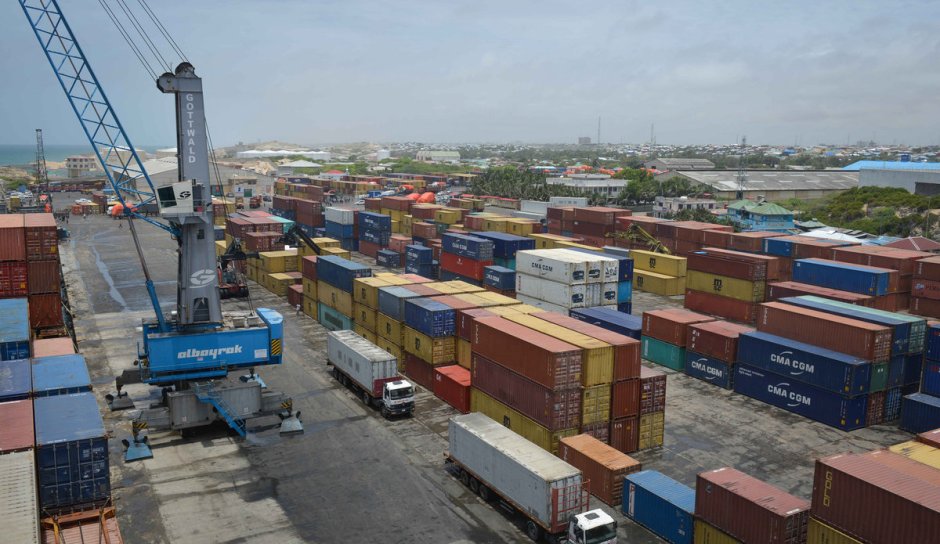An advisory committee that monitors Somalia’s public finances says it is concerned about a possibly unfavorable contract between the Ministry of Ports and UAE firm Simatech to manage dry port services in Mogadishu.
The Financial Governance Committee (FGC) is a hybrid organ comprising both Somali government members, chaired by the Minister of Finance, and donor delegates, including the International Monetary Fund, the World Bank, the African Development Bank and others.
As an advisory body, the group does not make actual spending or budgeting decisions but rather publishes periodic ‘progress reports’ and advisory notes on specific issues.
In a report released on April 19th, the FGC reviewed the strengths and weaknesses of Somalia’s current public procurement processes. The report says that most contracts that it reviewed “did not result from any competitive tender process.” Instead, they resulted from direct negotiations between Somali government agencies and contractors.
“From a financial governance perspective, this kind of approach to contracting gives significant cause for concern; it lacks transparency, which inevitably gives rise to suspicions of corruption, and carries a substantial risk that the contract terms will not offer value for money for (the Federal Government of Somalia),” reads the report.
The committee cited several examples of contracts of this kind: “These include the airport taxi contract between the Somalia Aviation Authority and Sahel, whose terms are still unknown to the (committee), and the dry port contract between Simatech and the Ministry of Ports.”
Simatech is a UAE-based shipping firm that has been providing shipping and unloading services at Mogadishu harbor since 2013. The firm stepped in due to dilapidated facilities at the port including a lack of functioning cranes. It works through a locally registered company called Mogadishu Port Container Terminal (MPCT). But according to FGC, Simatech won its port contract and without adequate transparency. The contract is significant because Mogadishu Port is one of the top sources of non-tax revenues for the Somali federal government.
But according to FGC, Simatech won its port contract and without adequate transparency. The contract is significant because Mogadishu Port is one of the top sources of non-tax revenues for the Somali federal government.
“The Simatech contract, which the FGC received through unofficial channels… is a good example of the risks of sole-source contracting without full diligence. The contract provides Simatech with a long-term, exclusive concession for storage and customs clearance of goods entering the port of Mogadishu, and carries substantial financial penalties should FGS decide to terminate it,” reads the report dated March 2017 but released publicly in April.
The finance committee further says work by Simatech conflicts with a second contract awarded to a Turkish company also in 2013 to manage the Mogadishu harbor: “The services that are granted exclusively to Simatech are currently being provided by Al Bayrak under its port management concession. (Somalia’s government) will need to find a way of unscrambling the potential conflict between the two contracts in the context of the renegotiation of the Al Bayrak concession.”
‘Abnormally high charges’
This is not the first time that the donor-backed Financial Governance Committee has voiced concerns about the Simatech contract. In a confidential assessment dated April 2014, FGC called the arrangement with Simatech “so flawed that the Government should consider outright cancellation, or at the least renegotiation.”
The confidential assessment, which was published online before being removed (a copy is still available via Google Cache), revealed that Simatech’s subsidiary MPCT was given exclusive license to manage container traffic through Mogadishu Port on the condition that it remit 20% of its revenues to the Mogadishu Sea Port Authority.
But the agreement did not say anything about “reporting and information requirements by the contractor,” which means that the Port Authority needed to rely on the information provided by MPCT. “This will leave calculations of revenue due from MPCT to the Mogadishu Sea Port Authority in the hands of the contractor,” the 2014 report stated.
“This contract is substandard in many ways. The agreement awards exclusive rights to one company to handle all containers arriving into and leaving the port without any obligations, liabilities or performance standards being placed on the awardee. What is more, the charges specified in the contract are abnormally high when considered against international norms,” the report concludes.
‘Encouraging signs’
Nonetheless, the Financial Governance Committee says that overall there are some signs of improvement in procurement processes within the Somali federal government. For example, Somalia’s government has committed to competitive tendering of rations contracts for the security sector, including for police, army and intelligence soldiers.
“In addition, in line with FGC advice, (the Somali government) is moving to strip out the cash component that is included in these contracts, and is committed to paying rations cash directly to personnel through the salary payment system,” the report says.
FGC recommends that Somalia’s government consider mandating that all contracts over a certain threshold go through the Ministry of Finance’s Procurement Unit “as an interim measure until procurement units in line ministries have the necessary capabilities.”
The report also recommends that the new Prime Minister Hassan Ali Khaire issue a decree specifying procurement roles and responsibilities until the finalization of a Procurement Act by parliament.





























